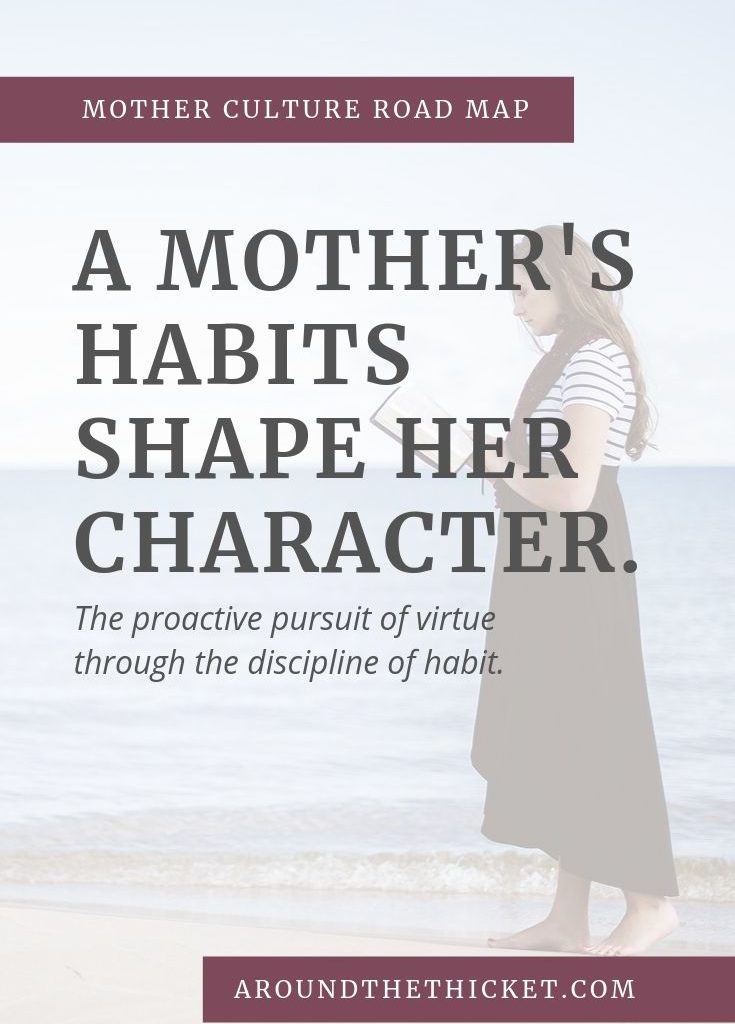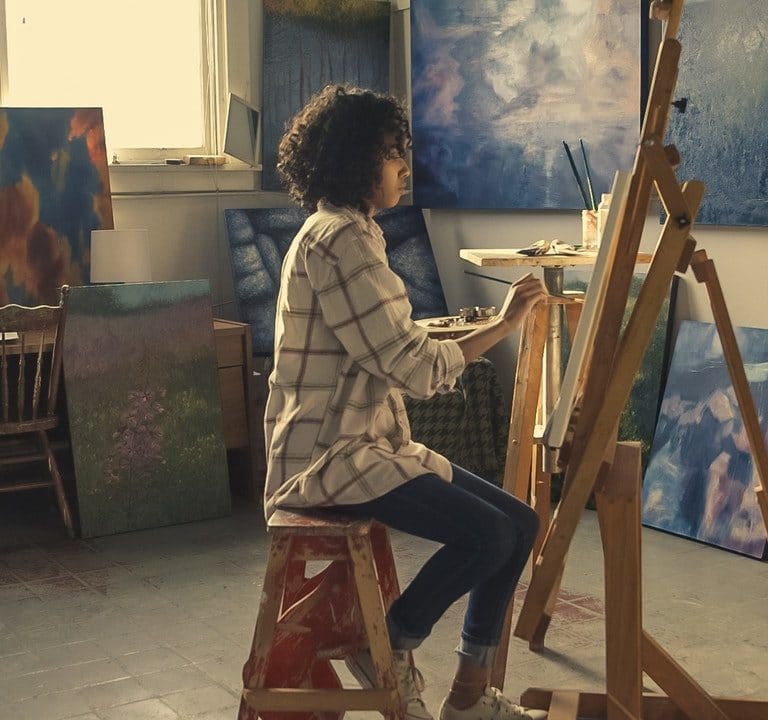A mother’s habits shape her character.
If there is one false impression I took from the enormous stack of Christian marriage books that I read during my engagement, it’s that getting married puts you on the fast track to sanctification – and there is nothing else you need to do. Becoming more Christlike will happen as you and your spouse learn to live together. You will by necessity learn humility, forgiveness, reconciliation, and so on.
This mindset is completely reactive to our faith and to life in general. (It also happens to ignore the sanctification of single men and women). Yes, these books remind us that we should read our Bible and pray. However, they don’t fully address how we can build up and strengthen our character so that we are able to respond appropriately to the challenges we face in life.
Habit allows us to be proactive.
I am constantly trying to figure out how to get my kids to do the things I ask. Things like, ‘put your pajamas on’ or ‘pick up your toys’. I have varying amounts of success, but one thing that remains the same. When my kids start to goof off, run away, or display selective hearing, my temper starts to rise. Soon after that, my ability to deal with the situation with patience and kindness evaporates.
My kids need to grow in the habit of obedience. I know this. But I recently realized that my frustrated response to their disobedience is taking root in my life as a habit. Consequently, if I want to deal with my children’s disobedience with calm patience and good teaching, then I need to replace that habit with a better one. This is what the marriage books miss out: that actively cultivating godly habits is a necessary part of sanctification.
When we don’t give our habits their due attention, we can find ourselves frustrated that we face the same challenges with the same, unholy responses time after time. If marriage and children provide plenty of opportunities for sanctification, then shouldn’t we get better over time at responding in a Christlike way when our kids push the limits or we have a conflict with our spouse?
Truth be told, yes, we ought to get better. And to a certain measure, by God’s grace, we do improve. But Charlotte Mason didn’t believe that we should let give our children over to their nature. We shouldn’t trust that one day, they’ll ‘grow out of it’. Similarly, we shouldn’t assume that we will simply mature out of our besetting sins. We need to strike a balance between trusting to atmosphere and, in wisdom, doing some footwork on our part. The footwork that we can bring to this process is the discipline of habit training.

We are wired for habit.
Our culture places a lot of value on effort and productivity. The harder we work, the more we produce, and the better people we are. This isn’t just in our jobs – we bring this into our faith as well. The harder we work at patience, kindness, self-control or any virtue, the more virtuous we will become. At least that’s what the logic of the day tells us, and that line of thinking leads us to overlook what is effortless in our lives: our habits.
We all have habits, for better or for worse, whether we like it or not. There are simply too many things going on in our lives to make active decisions about all of them. We don’t usually consciously decide to brush our teeth before bed, to put the kettle on after walking into the kitchen in the morning, or to pick up our phone every time it vibrates, because we do those things reflexively. There is no effort of decision involved. We carry out habits on autopilot.
And habits are a good thing, too. We talk about decision fatigue at the grocery store: there are so many options for every item, that after a short time, surveying the choices, evaluating the best one, and actually choosing each item becomes overwhelming and exhausting. Imagine how tiring life would be if we also actively decided which shoe to put on first every time we left the house. With habits, we have already made the decision. The action may require work, but there is no effort of choice.

Habit training starts with ideas.
In most cases, we develop habits without intentional effort on our part. We picked them up from our family as we grew up, or in response to a challenging situation in our lives. We did something once, that action satisfied us in some way, and when prompted, we did it again and again, until that action became deeply wired into our neurological structure.
Therein lies the good news: our neurological structure is not fixed, but changeable. God is completing the work He began in us, right down to our physical brain structure. By His grace, we can replace bad habits with good ones. Not only that, but it is a worthy effort to build habits within ourselves that help us to reflexively respond to life in a Christlike way. Contrary to what our culture thinks, it’s not the amount of effort you put into virtue that makes you virtuous – it’s responding virtuously without effort that shows that you have a good character. That is the fruit you are bearing in life.
How do we start habit training ourselves? The same way Charlotte Mason would have us start with our children: with ideas. Something that we read in the Bible or another living book, that we hear in a sermon, or that we observe in another person. The Holy Spirit uses these ideas to convict us, lead us to repentance, and turn away from our sin. We need ideas in abundant measure, to help us see ourselves as God sees us, so that we can better walk in a way that pleases Him.
Godly habits bring joy.
Habit training is not easy. It requires much insight, intrinsic motivation, and self-discipline. Despite the work required, habit training brings joy. It’s not that learning to respond to challenging children with patience every single time is fun. It’s because somewhere along the way of habit training, we no longer need to decide to respond with patience. It becomes the default option. There is no effort of choice, no decision fatigue, no fighting with one’s conscience between doing what one ought and doing something else.
And here is the essence of a good character – that choosing the correct way is no longer a choice. It is what we do, naturally, by habit.
Want to find your feet with the Charlotte Mason Way?

Grab my eight day mini course on the Charlotte Mason Essentials when you subscribe to my newsletter. You’ll get daily emails, a mini podcast series, and a printable workbook with reading assignments and action steps. You’ll be on your Charlotte Mason journey in no time!









As a stay at home mom with little children, I loved reading this. Just the reminder I needed. Thank you!!
You are so welcome, Christina!
Thank you for this reminder. It’s difficult sometimes not to get upset with our children when they don’t respond the first time. What a great reminder to remember to respond with grace & patience.
This was very encouraging and motivating. Thank you
You are very welcome!
This was something I needed to read without even knowing it. Thank you for the encouragement.
You are so welcome, Courtney! Thank you for the comment 🙂
I am in a season of littles, with small children, money and time. This was the reminder I needed with my defiant 2 yo. Thank you 🙏 I am rediscovering your content and it is helping me have some grace – with myself and my children
I’m so glad to hear that, Simone! We all need grace – so much of it – each day!